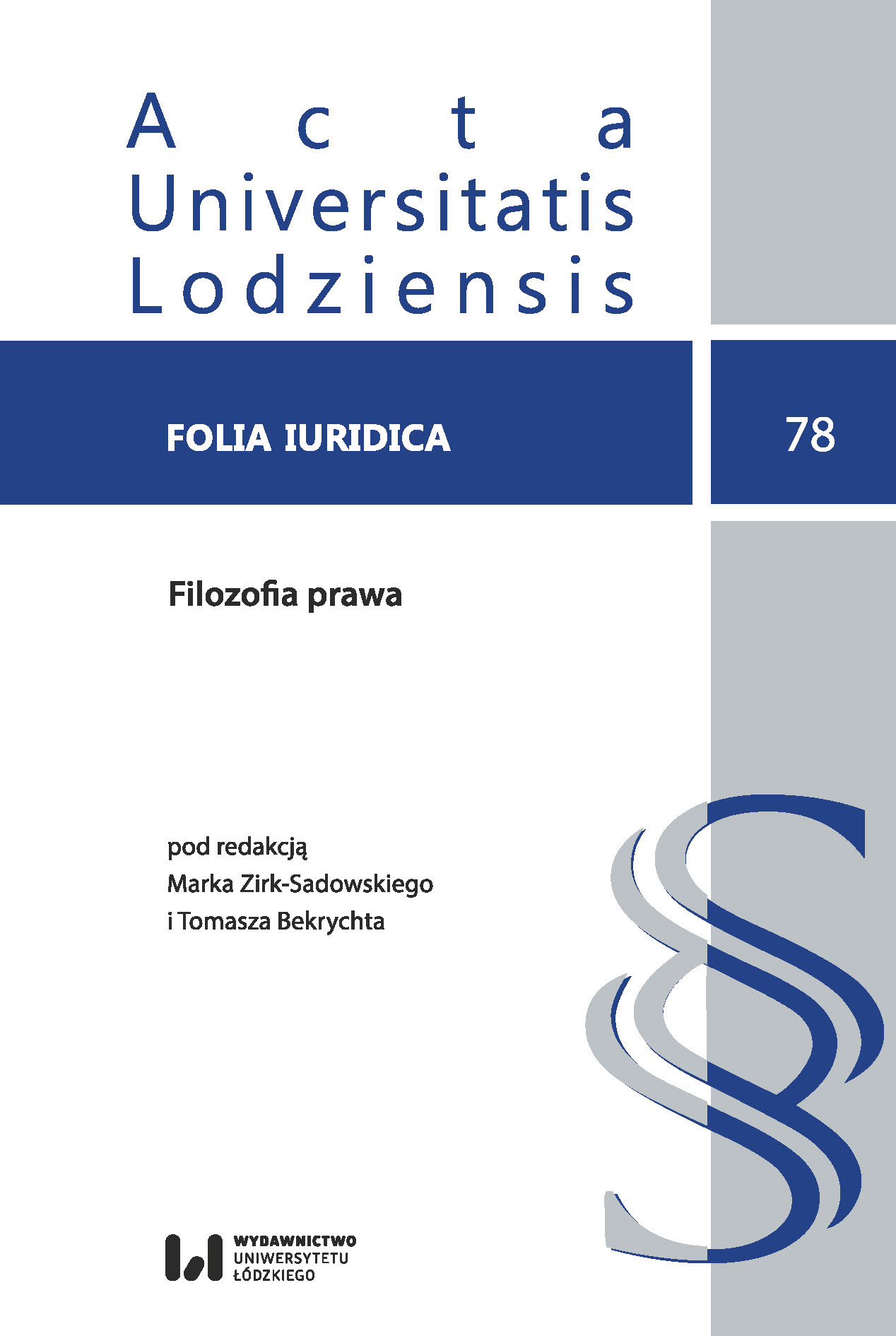Apply the law, and do what you want? The concept of judicial independence and the prospective of a deontological model of judicial virtues
DOI:
https://doi.org/10.18778/0208-6069.78.07Keywords:
independence, deontology, judicial virtues, theory of judging, Dworkin, HartAbstract
This article explores judicial independence in light of a deontological model of virtues. It analyses judicial decisions and attitudes in the process of application of law, arguing that their aspirations to pursue judicial virtues are a secondary requirement against an overriding demand for abiding by law. The thesis is that judicial independence is a kind of a system presupposition that judges have some qualities which help them not only to fulfil their duties, but also to rise to ethical challenges during adjudication. The author recalls two theories of judicial reasoning in hard cases and tries to answer the question which of the theoretical models – by H. L. A. Hart or R. Dworkin – proposes a better characteristic of the judicial practice in the Polish justice system.
Downloads
References
Berlin, Isaiah. 1994. Cztery eseje o wolności. Warszawa: Wydawnictwo Naukowe PWN.
Google Scholar
Bielska-Brodziak, Agnieszka. 2012. „Materiały legislacyjne w dyskursie interpretacyjnym z perspektywy brytyjskiej, amerykańskiej, francuskiej, szwedzkiej i polskiej”. W Konwergencja czy dywergencja kultur i systemów prawnych? Red. Oktawian Nawrot, Sebastian Sykuna, Jerzy Zjadło. Warszawa: C.H. Beck.
Google Scholar
Dąbrowski, Stanisław. 2012. „Niezawisłość sędziów – gwarancje ustrojowe i zagrożenia”. Krajowa Rada Sądownictwa 2: 12–15.
Google Scholar
Dworkin, Ronald. 1986. Law’s Empire. London: Harvard University Press.
Google Scholar
Dworkin, Ronald. 2011. Justice for Hedgehogs. London: Harvard University Press.
Google Scholar
Fuller, Lon L. 1969. Morality of Law. New Haven, CT: Yale University Press.
Google Scholar
Galewicz, Włodzimierz 2013. Status ludzkiego zarodka a etyka badań biomedycznych. Kraków: Wydawnictwo Uniwersytetu Jagiellońskiego.
Google Scholar
Hart, Herbert L. A. 1961. The Concept of Law. Oxford: Clarendon Press.
Google Scholar
Hart, Herbert L. A. 2014. „Nowe wyzwanie dla pozytywizmu prawniczego”. Archiwum Filozofii Prawa i Filozofii Społecznej 2 (9): 5–20.
Google Scholar
Hauser, Roman. 2015. „Konstytucyjna zasada niezawisłości sędziowskiej”. Zeszyty Naukowe Sądownictwa Administracyjnego 1: 9–23.
Google Scholar
La Torre, Massimo. 2007. Constitutionalism and Legal Reasoning. Dordrecht: Springer.
Google Scholar
Rocławska, Anna. 2015. „Czy polski sędzia wymaga od sędziów »dzielności etycznej«? Rozważania na tle ustawowego wymogu »nieskazitelności charakteru«”. Ogrody Nauk i Sztuk 5: 99–110.
Google Scholar
Saja, Krzysztof. 2015. Etyka normatywna między konsekwencjalizmem a deontologią. Kraków: Universitas.
Google Scholar
Skrzydło, Wiesław. 2013. „Komentarz do art. 178 Konstytucji Rzeczypospolitej Polskiej”. Konstytucja Rzeczypospolitej Polskiej. Komentarz. Warszawa: Lex a Wolters Kluwer business.
Google Scholar
Solum, Lawrence. 2006. “Natural Justice”. American Journal of Jurisprudence 51 (1): 65–105.
Google Scholar
Tobor, Zygmunt. 2005. „Bezstronność sędziego”. Przegląd Sądowy 6: 3–15.
Google Scholar
Tobor, Zygmunt. 2013. W poszukiwaniu intencji prawodawcy. Warszawa: Lex a Wolters Kluwer business.
Google Scholar
Tobor, Zygmunt. 2015. „To do a great right, do a little wrong – rzecz o sędziowskich kłamstewkach”. Przegląd Podatkowy 6: 15–22.
Google Scholar
Konstytucja Rzeczypospolitej Polskiej z dnia 2 kwietnia 1997 r. (Dz. U. 1997, Nr 78, poz. 483 ze zm.).
Google Scholar
Ustawa z dnia 27 lipca 2001 r. – Prawo o ustroju sądów powszechnych (Dz. U. 2001, Nr 98, poz. 1070 ze zm.).
Google Scholar
Zbiór Zasad Etyki Zawodowej Sędziów. Załącznik do uchwały nr 16/2003 Krajowej Rady Sądownictwa z dnia 19 lutego 2003 r.
Google Scholar
Postanowienie SA w Katowicach z 26 marca 2014 r. (II S 13/14, Portal Orzeczeń Sądu Apelacyjnego w Katowicach, opubl. 2.09.2014).
Google Scholar
Wyrok SA w Katowicach z 17 stycznia 2013 r. (III AUa 915/12, Portal Orzeczeń Sądu Apelacyjnego w Katowicach, opubl. 29.03.2013).
Google Scholar
Wyrok SA w Katowicach z 25 lipca 2013 r. (V ACa 251/13, Portal Orzeczeń Sądu Apelacyjnego w Katowicach, opubl. 29.11.2013).
Google Scholar
Wyrok SA w Katowicach z 13 lutego 2014 r. (II AKa 509/13, Portal Orzeczeń Sądu Apelacyjnego w Katowicach, opubl. 9.05.2014).
Google Scholar
Wyrok TK z 24 czerwca 1998 r. (K 3/98, MP Nr 22, poz. 331).
Google Scholar
Wyrok TK z 14 kwietnia 1999 r. (K 8/99, OTK ZU 1999/3, nr 3, poz. 31).
Google Scholar
Wyrok TK z 7 listopada 2013 r. (K 31/12, Dz. U. 2013 r., poz. 1433).
Google Scholar
Downloads
Published
How to Cite
Issue
Section
License
Copyright (c) 2017 © Copyright by Authors, Łódź 2017; © Copyright for this edition by Uniwersytet Łódzki, Łódź 2017

This work is licensed under a Creative Commons Attribution-NonCommercial-NoDerivatives 4.0 International License.














